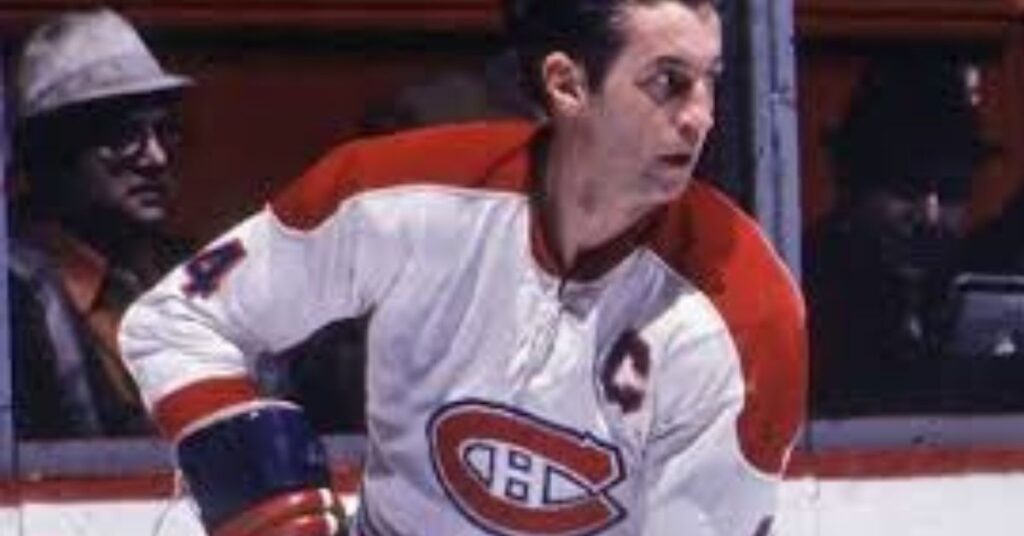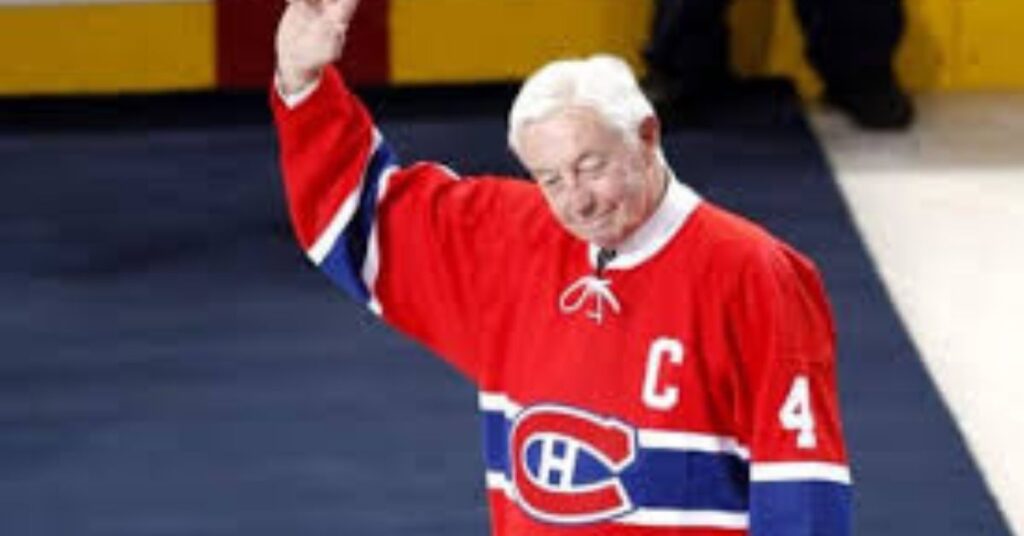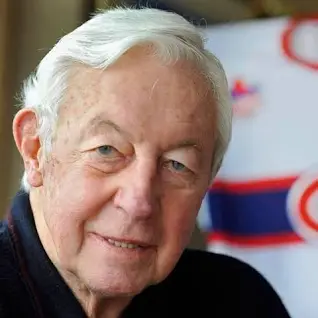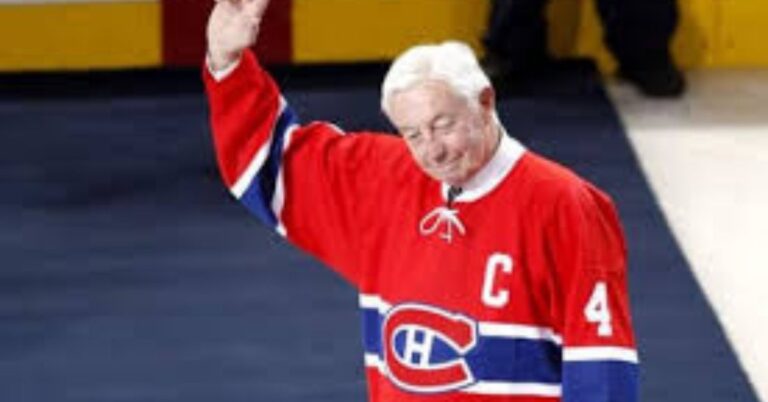Widely regarded as part of the top ten NHL players of all time, Jean Beliveau was inducted into the National Hockey League Hall of Fame in 1972. His life and career are worth reading. Get to know more about this hockey legend who sadly passed away in 2014. His biography, net worth, awards, profession, family, and others are covered here.
Table of Contents
| Category | Details |
|---|---|
| Full Name | Joseph Jean Arthur Béliveau |
| Date of Birth | August 31, 1931 |
| Place of Birth | Trois-Rivières, Quebec, Canada |
| Nationality | Canadian |
| Height | 6 ft 3 in (191 cm) |
| Weight | 205 lb (93 kg; 14 st 9 lb) |
| Position | Centre |
| Shot | Left |
| Teams | Montreal Canadiens |
| Playing Career | 1950–1971 |
| NHL Debut | 1950 |
| NHL Retirement | 1971 |
| Parents | Arthur Béliveau (father), Lorette Dubé (mother) |
| Spouse | Elise Couture |
| Children | Hélène Beliveau |
| College | Attended college and played for the team |
| Junior Hockey | Played for Victoriaville Tigres and Quebec Citadelles |
| NHL Awards | Two Hart Memorial Trophies, one Art Ross Trophy, one Conn Smythe Trophy |
| Stanley Cups | 17 championships |
| Hall of Fame | Inducted in 1972 |
| Charitable Work | Established the Jean Béliveau Foundation |
| Support | Supported various causes, including the Quebec Society for Disabled Children |
| Order of Canada | Officer |
| L’Ordre National du Québec | Member |
| Honorary Doctorate | University of Moncton |
| Impact | Widely regarded as one of the greatest NHL players of all time |
| Records | Held NHL playoff points record until surpassed by Wayne Gretzky |
| Date of Death | December 2, 2014 |
| Place of Death | Longueuil, Quebec, Canada |
| Cause of Death | Stroke |
Who is Jean Beliveau?
Jean Béliveau, often referred to by his nickname “Le Gros Bill,” was a well-known Canadian professional ice hockey player whose playing career was full of wonders and sheer brilliance. Born on August 31, 1931, in Trois-Rivières, Quebec, Béliveau’s start from a young boy playing shinny on backyard ice rinks to becoming one of the most revered figures in hockey history is nothing short of fascination.
Béliveau’s early career was distinguished by his innate aptitude and enthusiasm for the game. Béliveau was up in a family that traveled frequently due to his father’s job as an electrician, so he perfected his abilities on makeshift rinks in Quebec. His potential was instantly recognized, and he joined organized teams at a young age, including the Victoriaville Tigres and the Quebec Citadelles, where he revealed his scoring abilities and gained the moniker “Le Gros Bill.”
However, it was Béliveau’s discovery by Frank Selke, the general manager of the Montreal Canadiens, that would change the course of his life. Selke recognized Béliveau’s talent and sought to bring him into the NHL fold. Despite initial reluctance from Béliveau’s father, Selke’s persistence eventually led to Béliveau joining the Canadiens in 1953.
Standing at 6 feet 3 inches and weighing 205 pounds, he possessed a rare combination of size, skill, and grace that made him a dominant force in the NHL. In his 20-year career with the Canadiens, Béliveau amassed many honors, including two Hart Memorial Trophies as league MVP, one Art Ross Trophy as the top scorer, and the inaugural Conn Smythe Trophy as playoff MVP.
What truly set Béliveau apart, however, was his unparalleled success in the playoffs. With Béliveau as their centerpiece, the Canadiens captured an astonishing 17 Stanley Cup championships.
Even after retiring, he remained involved with the Canadiens organization, serving as a vice president and director of public relations. Additionally, Béliveau established the charitable Jean Béliveau Foundation to show his commitment to giving back to the community.
Béliveau was known for his humility, dignity, and integrity. He was a devoted husband to his wife Elise and a loving father to their daughter Hélène. Despite facing health challenges in his later years, Béliveau maintained a positive outlook.
Béliveau’s passing on December 2, 2014, marked the end of an era in Canadian hockey, where his death was mourned by fans across the globe, as well as by the hockey community. Béliveau’s funeral was held at the Mary Queen of the World Cathedral in Montreal. He will forever be remembered as “Le Gros Bill.”

What is Jean Beliveau’s age, height, and weight?
Béliveau was born on August 31, 1931, making him 83 years old at the time of his passing on December 2, 2014. He stood at an impressive height of 6 feet 3 inches (191 cm) and weighed 205 pounds (93 kg; 14 st 9 lb) during his playing career.
What is Jean Beliveau’s Nationality and Ethnicity?
Jean Béliveau was Canadian by nationality. Ethnically, he was of French-Canadian descent, from the province of Quebec.
What is Jean Beliveau’s profession?
Jean was a professional ice hockey player, who was born in Trois-Rivières, Quebec, on August 31, 1931. His hockey career began on the frozen ponds of his hometown and then grew into a valuable asset who stayed with the Montreal Canadiens for 20 years. He had a rare finesse which made him a dominant force on the ice, achieving two Hart Memorial Trophies as league MVP, one Art Ross Trophy as the NHL’s top scorer, and 17 Stanley Cup championships, the most by any individual to date.
| Year | Team | League | Awards/Events |
|---|---|---|---|
| 1947-1950 | Victoriaville Tigres | QJHL | – |
| 1950-1953 | Quebec Citadelles | QJHL | – |
| 1950-1951 | Montreal Canadiens | NHL | NHL debut |
| 1951-1952 | Quebec Aces | QSHL | – |
| 1952-1953 | Montreal Canadiens | NHL | – |
| 1953-1971 | Montreal Canadiens | NHL | 17 Stanley Cup championships, 2 Hart Memorial Trophies, 1 Art Ross Trophy, 1 Conn Smythe Trophy, NHL All-Star selections, numerous First and Second Team All-Star selections |
| 1971 | Retired from professional hockey | – | Jersey number (#4) retired by Montreal Canadiens |
Who are Jean Beliveau’s Parents?
Jean Béliveau’s parents were Arthur Béliveau and Lorette Dubé. Arthur worked as an electrician, which led to the family moving several times during Jean’s childhood.
Does Jean Beliveau have siblings?
Jean is the oldest of eight siblings. He grew up with them in the town of Victoriaville. Some notable siblings of Jean are Marie and Adolphe.
Who is Jean Beliveau married to?
Béliveau was married to Elise Couture. They tied the knot on June 27, 1953, at St. Patrick’s Church in Quebec City. Béliveau and Elise Couture had one child together, a daughter named Hélène. They met during a blind date and married after.
Does Jean Beliveau have children?
Yes, Jean had one child, a daughter named Hélène, with his wife Elise Couture.

What is Jean Beliveau’s Net Worth?
Jean has an estimated net worth of between $1 – 2 million.
How much does Jean Beliveau make annually?
For detailed statistics on his annual salary earnings, check the table below:
| Season | Earnings (US$) | Earnings (in today’s US$) | Team/League | Notes |
|---|---|---|---|---|
| 1947-48 | $1,040 | $14,197 | Victoriaville Tigres (QJHL) | Season earnings included a $200 bonus |
| 1948-49 | $980 | $12,416 | Victoriaville Tigres (QJHL) | – |
| 1949-50 | $5,406 | $69,181 | Quebec Citadelles (QJHL) | Also worked in Public Relations for Laiterie Laval |
| 1950-51 | $5,406 | $68,434 | Quebec Citadelles (QJHL) | Also worked in Public Relations for Laiterie Laval |
| 1951-52 | $9,500 | $111,504 | Quebec Aces (QSHL) | – |
| 1952-53 | $20,420 | $234,349 | Quebec Aces (QSHL) | Reported as the highest salary for a hockey player in the world |
| 1953-54 | $41,697 | $474,779 | Montreal Canadiens (NHL) | First full season in the NHL, signed a five-year contract |
| 1954-55 | $42,107 | $477,840 | Montreal Canadiens (NHL) | – |
| 1955-56 | $37,518 | $426,876 | Montreal Canadiens (NHL) | – |
| 1956-57 | $41,656 | $466,982 | Montreal Canadiens (NHL) | – |
| 1957-58 | $42,763 | $463,862 | Montreal Canadiens (NHL) | – |
| 1958-59 | $21,630 | $228,367 | Montreal Canadiens (NHL) | Estimated minimum base salary based on documented salary |
| 1959-60 | $26,075 | $272,558 | Montreal Canadiens (NHL) | Base salary of $25,000 |
| 1963-64 | $18,540 | $184,492 | Montreal Canadiens (NHL) | – |
| 1964-65 | $5,163 | $50,718 | Montreal Canadiens (NHL) | Received $5,570 in bonuses, including $1,000 for Conn Smythe |
| 1970-71 | $95,800 | $751,939 | Montreal Canadiens (NHL) | Retired from professional hockey |
| 1973-74 | $0 | $0 | – | Offered $300,000 by Quebec Nordiques, declined |
| 2004-05 | $0 | $0 | – | Sold memorabilia for nearly $1 million |
| 2019-20 | $0 | $0 | – | Sold memorabilia for approximately $360,000 |
What philanthropic causes or charities does Jean Beliveau support?
One significant philanthropic endeavor he initiated was the establishment of the Jean Béliveau Foundation. This foundation was created to support charitable initiatives, with a particular focus on assisting disabled children. In 1993, Béliveau transferred the operations of the foundation to the Society for Disabled Children to ensure its continued support for those in need.
| Philanthropic Endeavor | Description |
|---|---|
| Jean Béliveau Foundation | Established to support charitable initiatives, particularly focused on assisting disabled children. |
| Support for Disabled Children | Transferred the operations of the Jean Béliveau Foundation to the Society for Disabled Children in 1993. |
| Community Involvement | Actively involved in supporting numerous charitable events and organizations to make a positive impact. |
| Declined Political Appointments for Family Time | Turned down offers of political appointments to prioritize spending time with his family. |
Over a span of twenty-two years, Jean Béliveau managed to raise approximately $1,500,000 for various charitable endeavors, including supporting the Quebec Society for Disabled Children’s summer camp located northeast of Joliette, without actively seeking funds. He has also supported organizations like La Foundation Charles LeMoyne.
How many businesses does Jean Beliveau own?
Jean has also been involved in the corporate sector. This involvement includes serving as a director on up to eight boards, which have included prominent companies such as Molson Companies, Carena Developments, Dominion Textiles, Ader Leroux, and the Canadian Reinsurance Association.
How many awards has Jean Beliveau won?
Jean Béliveau has received several awards and honors in his career. Some of the notable awards and honors he has won include:
- Stanley Cup Championships: Béliveau achieved success in the NHL, winning the Stanley Cup a total of seventeen times. This includes ten championships as a player and seven championships as an executive for the Montreal Canadiens.
- Hart Memorial Trophy: Béliveau was honored with the Hart Memorial Trophy, awarded to the NHL’s most valuable player, on two occasions. He received this prestigious award in 1956 and again in 1964.
- Art Ross Trophy: In addition to his MVP honors, Béliveau also earned recognition as the league’s top scorer by winning the Art Ross Trophy in 1956.
- Conn Smythe Trophy: Jean received the Conn Smythe Trophy in 1965. This award is presented to the most valuable player during the NHL playoffs.
- NHL All-Star Game Selections: In his career, Béliveau was selected to participate in the NHL All-Star Game an impressive thirteen times between 1953 and 1969.
- Induction into the Hockey Hall of Fame: In recognition of his outstanding achievements and contributions to the sport, Béliveau was inducted into the Hockey Hall of Fame in 1972.
| Detail |
|---|
| Inducted into the Hockey Hall of Fame in 1972 |
| Named one of the ‘100 Greatest NHL Players’ in history in 2017 |
| Won two Hart Memorial Trophies as league MVP (1956, 1964) |
| Won one Art Ross Trophy as top scorer (1956) |
| Won the inaugural Conn Smythe Trophy as play-off MVP (1965) |
| Held the NHL record for playoff points (176) until surpassed by Wayne Gretzky in 1987 |
| Won 17 Stanley Cup championships, the most by any individual to date |
| Named to the NHL All-Star Game 13 times between 1953 and 1969 |
| Named to the First Team All-Star in 1954–55, 1955–56, 1956–57, 1958–59, 1959–60, 1960–61 |
| Named to the Second Team All-Star in 1957–58, 1963–64, 1965–66, 1968–69 |
| Awarded the Art Ross Trophy in 1955–56 |
| Awarded the Hart Memorial Trophy in 1955–56, 1963–64 |
| Awarded the Conn Smythe Trophy in 1964–65 |
| Received the NHL Lifetime Achievement Award in 2009 |
| Played a pivotal role in the Montreal Canadiens’ Stanley Cup victories in 1956, 1957, 1958, 1959, 1960, 1965, 1966, 1968, 1969, and 1971 |
| Honored with an Honorary Doctorate from the University of Moncton |
| Appointed as an Officer of the Order of Canada |
| Named to L’Ordre National du Québec |
| Recognized with the Loyola Medal from Concordia University in 1995 |
| Added to Canada’s Walk of Fame in 2001 |
| Honored with a portrait on a Canadian postage stamp in 2001 |
| Had a Canadian Pacific Railway station named in his honor in 2008 |
| Named an honorary captain of the men’s national team for the 2010 Winter Olympics |
| Received several honorary doctorates from Canadian universities |
| Recognized as a Knight of the National Order of Quebec in 1988, promoted to Officer in 2006, and Grand Officer in 2010 |
| Awarded the Companion of the Order of Canada in 1998, then the country’s highest civilian award |

Was Jean Béliveau known by any other nickname besides “Le Gros Bill”?
Yes, Béliveau was affectionately referred to as “Le Gros Bill,” which translates to “Big Bill” in English. This nickname was coined by journalist Roland Sabourin and was inspired by a Quebecois film released in 1949.
Did Jean Béliveau excel in any other sports besides hockey?
Yes, Béliveau showed his athleticism in baseball as well. During his childhood, he played baseball in local leagues in Victoriaville as a pitcher and infielder. In fact, he received a minor-league pro contract offer for baseball at the young age of fifteen but ultimately pursued a career in hockey.
Did Jean Béliveau ever consider a career in politics?
Despite his notable achievements in hockey, Béliveau was offered opportunities to enter the political arena. In the early 1990s, he declined offers for a Senate appointment from Canadian Prime Minister Brian Mulroney, citing his belief that only elected legislators should hold such positions. Additionally, in 1994, he declined an offer to become the Governor General of Canada to prioritize spending time with his family following a personal tragedy.
Was Jean Béliveau involved in philanthropy?
Yes, Béliveau was involved in philanthropic efforts in his life. He established the Jean Béliveau Foundation, which supported charitable initiatives, particularly those benefiting disabled children. Additionally, he generously contributed to various causes and organizations.
Did Jean Béliveau face any challenges early in his hockey career?
Yes, Béliveau encountered challenges early in his hockey journey. He faced an initial reluctance from his father to sign an NHL contract. Instead of immediately joining the NHL, Béliveau initially signed a “B-form,” delaying his professional debut with the Montreal Canadiens until 1953.
Did Jean Béliveau ever express his opinions on non-hockey-related issues?
While Béliveau was known for his contributions to hockey, he also spoke out on broader societal issues. He joined other players in taking a stand against disgraced ex-NHLPA executive director Alan Eagleson, threatening to boycott the Hall of Fame if Eagleson were allowed to remain after being convicted of fraud and embezzlement. Additionally, Béliveau supported the NHL’s position during the 2004–05 NHL lockout.
What prestigious Canadian honors has Jean Béliveau received?
Jean Béliveau’s contributions to Canadian society have been recognized through several prestigious honors. He was appointed as an Officer of the Order of Canada, a distinction bestowed upon individuals who have made significant contributions to the country. Also, he was named to L’Ordre National du Québec.
Which university conferred an Honorary Doctorate upon Jean Béliveau?
The University of Moncton, located in New Brunswick, bestowed upon Jean Béliveau the distinction of an Honorary Doctorate.
How has Jean Béliveau been acknowledged for his national and provincial contributions?
Jean’s induction into the Order of Canada and appointment to L’Ordre National du Québec underscore his recognition on both national and provincial levels.
What are Jean Béliveau’s career statistics as a hockey player?
Jean Béliveau’s hockey career is marked by impressive statistics. He scored 507 goals and provided 712 assists across 1,125 games, all of which were played exclusively with the Montreal Canadiens.
Which legendary players were Béliveau’s teammates during his tenure with the Canadiens?
In his time with the Canadiens, Jean Béliveau had the privilege of playing alongside some of the most iconic figures in hockey history. His teammates included legends such as Rocket Richard, Dickie Moore, Jacques Plante, Gump Worsley, and Doug Harvey.
How did Jean Béliveau’s playoff performance compare to other NHL players?
Jean Béliveau accumulated 176 points in playoff action, setting a National Hockey League record at the time of his retirement. This achievement remained unmatched until 1987 when it was surpassed by Wayne Gretzky.


Comments are closed.